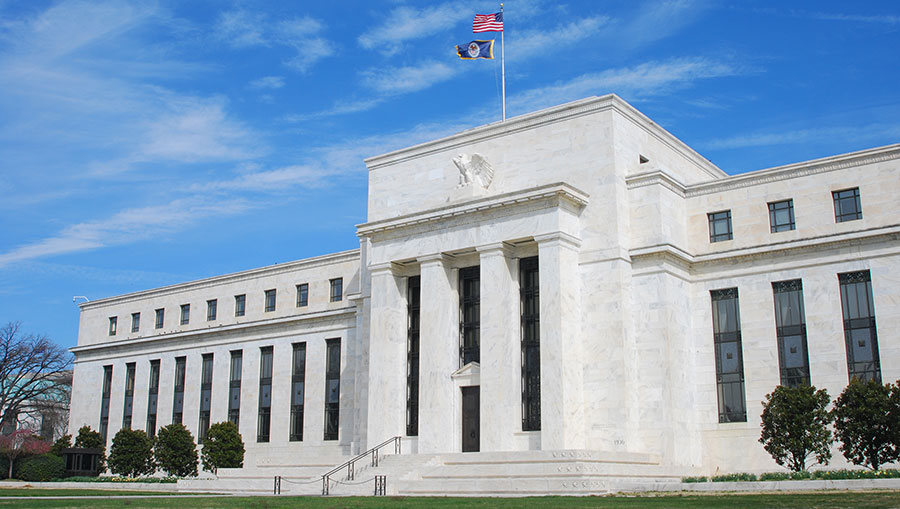Personal Wealth Management / Interesting Market History
Why Terrorism Doesn’t Terrorize Markets
Markets are a lot more resilient than many pundits give them credit for.
Amid all the gut-wrenching images and stories emerging from Afghanistan, stocks globally have held steady—a testament to markets’ seemingly coldhearted ability to see through local tragedies and continue pricing in the world’s economic future. Encouragingly, we haven’t seen pundits argue the country’s destabilization and Taliban control of American weapons and war materiel are directly negative for markets. But several now claim there is an indirect impact that looms over the future, courtesy of the heightened risk of terror attacks in the West now that the Islamic State and Al Qaeda have safe quarter. They point to the US stock market’s severe reaction to 9/11 and warn of repeats. To be clear, the risk of terrorism is real and omnipresent, and attacks can destroy lives and property on an unfathomable scale. But for stocks, the calculus is different, and the past 20 years have shown terrorism doesn’t cause lasting declines.
Perhaps counterintuitively, 9/11 both demonstrates this and explains why it is so. As Exhibit 1 shows, the S&P 500 plunged -11.6% between market close on September 10 and September 21, the post-attack low.[i] An attack of that scale on the World Trade Center and Pentagon was unprecedented and unexpected, a shocking tragedy that cut America deeply. This plus the associated uncertainty understandably sent markets reeling. But then the rout stopped, and in retrospect, it is easy to see why. People in lower Manhattan went back to work. Society pulled together and got on with it. It soon became clear that the economic effects weren’t huge—utterly disproportionate with the impact on thousands of families and the national psyche. Business continued. Markets callously accepted the reality that terrorism was part of our lives, and moved on. Just 19 trading days after 9/11, markets regained September 10 levels. The S&P 500 finished the year higher than its pre-attack level. The bear market that had begun back in March 2000 would last until October 2002 as investors continued dealing with the dot-com bubble’s implosion and fallout from the Sarbanes-Oxley Act’s problematic consequences, but 9/11’s negativity was a small pocket.
Exhibit 1: US Stocks and 9/11
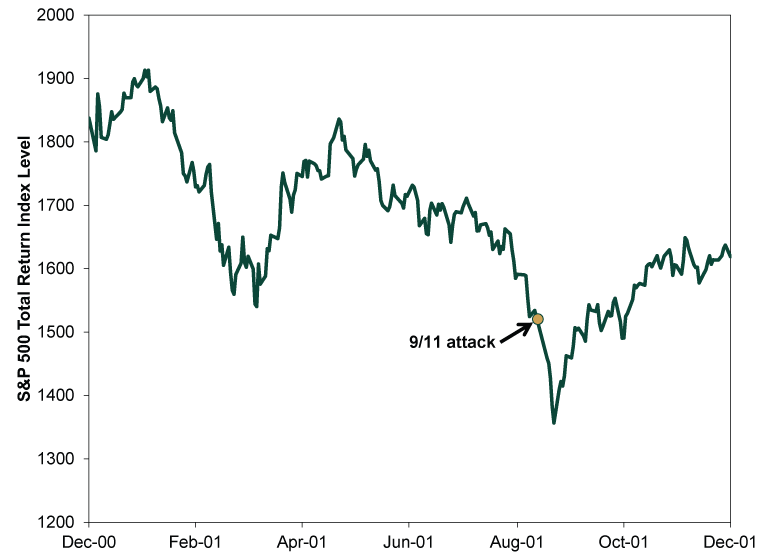
Source: FactSet, as of 9/11/2018. S&P 500 Total Return Index, 12/31/2000 – 12/31/2001.
Before 9/11, a potential large-scale terror attack on home soil wasn’t front-of-mind for most Americans. Yes, those of us who are of a saltier vintage had seen the 1993 World Trade Center bombing, so-called “lone wolf” attacks like the Oklahoma City bombing, and violence from domestic terror groups like the Weather Underground. Al Qaeda’s attack on the USS Cole was also rather fresh in the national memory, alongside the US embassy bombings in Africa. But all had conditioned Americans to think of terror attacks as small and isolated. As we watched the collapsing towers, smashed Pentagon and smoldering wreckage of Flight 93 that bright September morning, we had to change our frame of reference and expectations instantaneously.
Hence, when we lost our collective innocence on 9/11, terror attacks—even huge ones—lost their surprise power over society and stock markets. Even as America was spared from major incident, attacks in Madrid, London, France and Germany reiterated the constant threat. We remember it every time we remove our shoes and plastic baggies of travel-sized toiletries at TSA checkpoints. If anything, the seismic shift in Afghanistan prevents us from getting complacent, keeping the surprise factor at bay.
As terror attacks big and small continued, their market impact grew small and increasingly difficult to isolate from other variables. As Exhibit 1 shows, while Spanish stocks fell -9.3% the week of the Madrid train bombings in 2004, this incident happened on the home stretch of a contentious general election campaign—often a time of heightened uncertainty for stocks. The following year, UK stocks’ apparent reactions to the 7/7 London bombings lasted all of one day. (Exhibit 3) A decade later, a stream of attacks in France (Exhibit 4) arrived during a global stock market correction that stemmed from investors’ overreaction to currency reforms in China, not terror. In 2017, a tragic run of attacks in London and Manchester largely blended in with UK stocks’ day-to-day volatility. (Exhibit 5)
Exhibit 2: Spanish Stocks and the Madrid Train Bombings

Source: FactSet, as of 9/11/2018. MSCI Spain Index with net dividends in USD, 12/31/2003 – 12/31/2004.
Exhibit 3: UK Stocks and the 7/7 Bombings
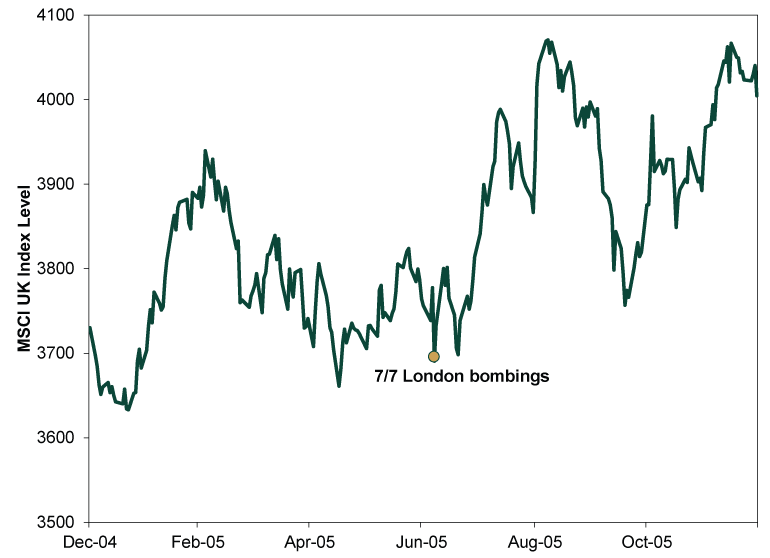
Source: FactSet, as of 9/11/2018. MSCI UK Index with net dividends in USD, 12/31/2004 – 12/31/2005.
Exhibit 4: French Stocks and the Mid-2010s Attacks
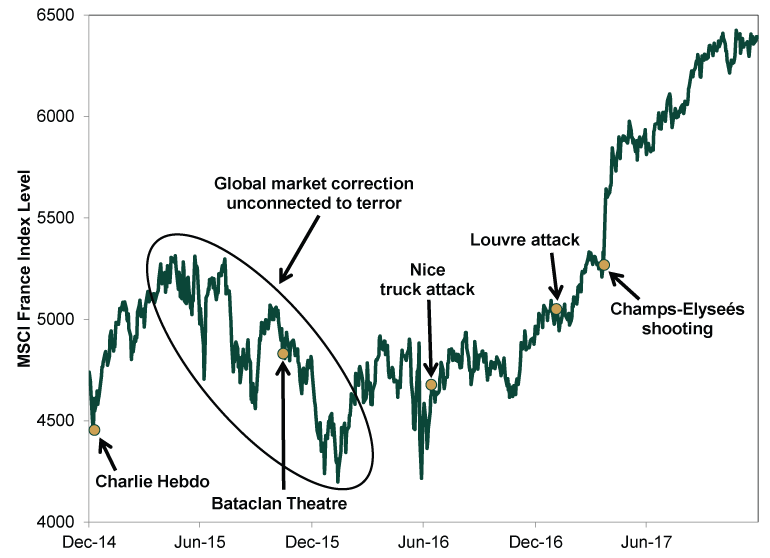
Source: FactSet, as of 9/11/2018. MSCI France Index with net dividends in USD, 9/30/2014 -12/31/2017.
Exhibit 5: UK Stocks and the 2017 Attacks
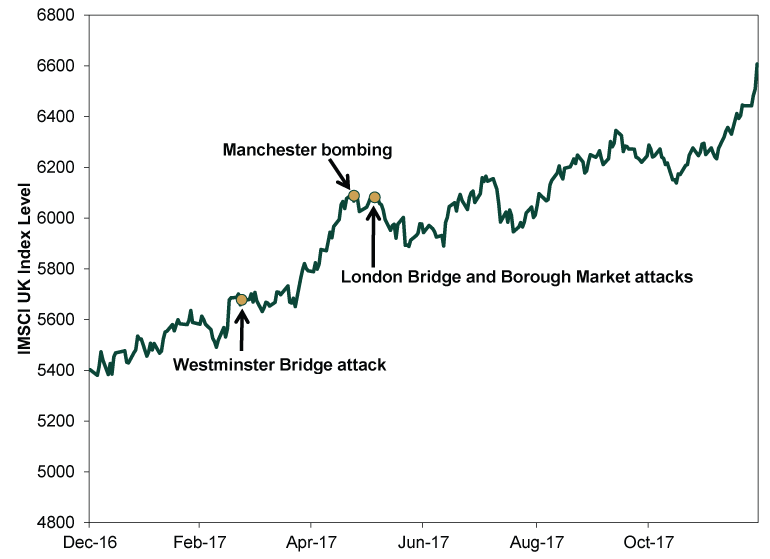
Source: FactSet, as of 9/11/2018. MSCI UK Index with net dividends in USD, 12/31/2016 – 12/31/2017.
In our view, this is all a striking testament to the power and resilience of free societies. Like the people whose transactions they register, markets are defiant. They stand because we stand, even despite threats and, sometimes, very real tragedies. We hope and pray that attacks won’t happen. We don’t really know if they are any more likely now than a month, year or three years ago. But we are confident that if terrorist strikes come, society and markets shall overcome, as they always have before.
[i] Source: FactSet, as of 9/11/2018. S&P 500 total return, 9/10/2001 – 9/21/2001.
If you would like to contact the editors responsible for this article, please message MarketMinder directly.
*The content contained in this article represents only the opinions and viewpoints of the Fisher Investments editorial staff.
Get a weekly roundup of our market insights
Sign up for our weekly e-mail newsletter.

You Imagine Your Future. We Help You Get There.
Are you ready to start your journey to a better financial future?

Where Might the Market Go Next?
Confidently tackle the market’s ups and downs with independent research and analysis that tells you where we think stocks are headed—and why.




